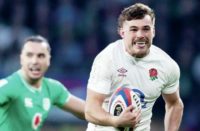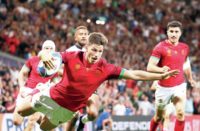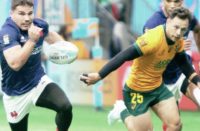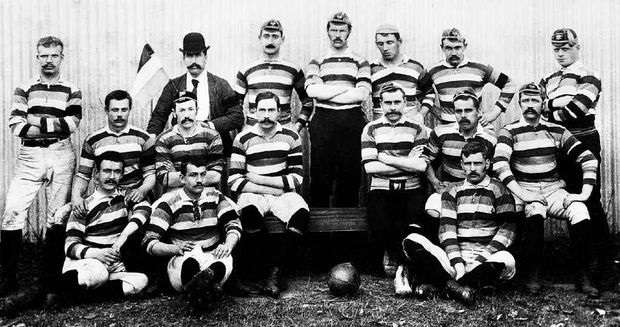 Whisper it quietly but the first Lions tour to New Zealand in 1888, which took in Australia as well, was all about money and the bottom line. There was scarcely an amateur thought to be divined in the entire eight-month trip no matter what gloss we try to put on proceedings.
Whisper it quietly but the first Lions tour to New Zealand in 1888, which took in Australia as well, was all about money and the bottom line. There was scarcely an amateur thought to be divined in the entire eight-month trip no matter what gloss we try to put on proceedings.
The tour was bizarrely put together by three of the biggest names in English cricket. Arthur Shrewsbury was one of the great opening batsman of that era and considered second only to WG Grace. He was also a quasi shop steward for professional cricketers and a would-be entrepreneur, to boot, anxious to make his fortune.
His Nottinghamshire colleague Alfred Shaw, meanwhile, was one of England cricket's great early bowlers and another man driven by the need to make money while James Lillywhite was England's first Test captain.
All three were buccaneers and had cashed in royally organising three England cricket tours to Australia – in 1881-82, 1884-85 and 1886-87 – before they undertook a fourth in 1887-88 which to their consternation and surprise turned into a crushing financial disaster. The failure was largely on account of the Australians being sated with incoming England cricket teams – indeed that summer there was another England tour party in Australia, the George Vernon X1 whose star turn was the dashing batsman and sporting all-rounder Andrew Stoddart.
Gamblers at heart, they audaciously decided to go for broke. Double or quits. Using all their many contacts in the Antipodes they would organise a rugby tour of New Zealand and Australia to cover their losses and it was an eclectic and hastily gathered tour party their agents came up with, selected primarily on availability.
Those who most speedily answered the call were a group of adventurous players from northern England looking to see the world but mainly wanting to earn a few bob.
More by chance than design the squad did, however, include all four Home Unions. Well sort of. There were three players from the Hawick club, a redoubtable Scottish manager in former Scotland footballer John Smith, who was also pressed into service as a player, a capped Welshman in Willie Thomas of Cambridge University while AG Paul, although a player with the Isle of Man and Swinton, was born in Belfast.
Shrewsbury made do with just 22 players and one of those, Jack Clowes, was banned by the RFU literally on the eve of departure when it came to their notice that the Halifax man had received the admittedly generous clothing and kitting ‘allowance' of £15. Their decision came through at the party's farewell banquet.
Seemingly ignorant of the fact that all the players was being paid considerably more for touring – contracts had been drawn up and signed by all concerned – he was banished but Clowes travelled anyway and enjoyed one of the great runs ashore in sporting history, a six-month tour without being required to play. Something tells me that somewhere along the line he would have kitted out under an alias or masqueraded as one of his teammates for a couple of games but nice work if you can get it.
The financially-driven Shrewsbury had organised 19 rugby games in New Zealand, 16 in Australia and another 19 games of Victorian Rules (which became Aussie Rules) as additional ‘earners' in Australia. The rugby in New Zealand was to prove much the most demanding part of the tour with two defeats and four draws in their 19 matches. They won all their union games in Australia bar one draw
The heroic Harry Eagles – no other word suffices – played in all 54 matches which must be some kind of a record. Despite being listed as only 5ft 7in and less than 12st he was a warrior for Salford and Lancashire and holds the unusual distinction of being capped by England without ever playing for them.
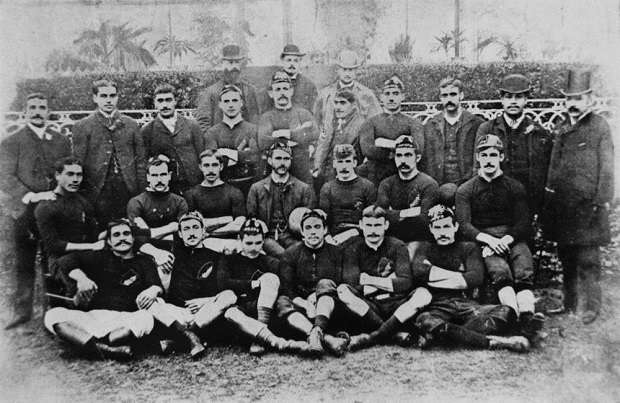 During the 1887-88 season he starred for the North against the South, the big representative game of the era in England, but the RFU's dispute with Scotland, Wales and Ireland over the setting up of an International Board meant they played no internationals that year. The Home Unions falling out is by no means a new phenomenon.
During the 1887-88 season he starred for the North against the South, the big representative game of the era in England, but the RFU's dispute with Scotland, Wales and Ireland over the setting up of an International Board meant they played no internationals that year. The Home Unions falling out is by no means a new phenomenon.
The RFU did, however, pick an England XV for the season to acknowledge those who would have played and as a ‘debutant' Eagles received his cap through the post shortly before embarking on the Lions tour.
The tour party sailed to Dunedin on the good ship Kaikoura, via Tenerife, Cape Town and Hobart, and were accompanied on board by 300 stoats and weasels which were going to be introduced into New Zealand in an attempt to curb the rampant rabbit population. Their reception as the first touring side from overseas was ecstatic – and no doubt encouraged the formation of the first New Zealand team to tour England the following year – with the Otago Witness running extensive and flattering biographies of all concerned in a special edition.
The Witness correspondent reported that during the boat journey: “Athletic sports were organised on deck but so many balls were lost overboard that the pastime had to be abandoned. The physique of the men has generally been admired and they appear to be in excellent health although a little out of condition.”
Shrewsbury had decided on jerseys with patriotic red white and blue stripes and right from the off the rugby proved to be more challenging than expected with Otago putting up stern resistance before losing 8-4. A crowd of 8,000 and £350 gate receipts was outwardly encouraging enough but Shrewsbury very soon realised he had backed another loser financially.
The crippling overheads – the players' contracts, £1,000-plus to ship the squad out, hotel accommodation, subsistence, trains – were just too big. New Zealand was not a populous country, the crowds generally were keen but sparse. Ever the showman and entrepreneur he spoke at all times about the success off the tour but in truth he and his partners were taking another huge hit.
A busy schedule of playing and travelling allowed for little rest and a drawn game against Wellington on May 12 suggested New Zealand sides were beginning to get their measure and later that week, playing their third game in five days, they lost to Taranaki in New Plymouth, the Lions first defeat.
They bounced back with a memorable 6-3 win over Auckland three days later at which point, reading between the lines, the tour went off the rails for a short while.
Five rest days beckoned before another game against Auckland before they sailed to Australia. The party of young men were in high spirits and it will possibly not surprise you to learn that a rather jaded Lions party lost the ‘return' game 4-0, offering up a rather lamentable performance.
As Shrewsbury wrote to Shaw: “We simply lost the match through our players not taking care of themselves. Too much whisky and women.”
It was a much fitter, battle hardened, but chastened, Lions party that returned to New Zealand nearly three and half months later to complete the second half of their New Zealand tour.
In the interim their captain Robert Seddon, a formidable capped England forward from Swinton had been drowned in a sculling accident on the River Hunter on August 15, the morning after he had led his team in a Victorian Rules match against Northern Districts in Maitland. Barely an hour earlier he had written and posted his latest column to the Manchester Courier which, rather eerily, was published posthumously.
Andrew Stoddart assumed the captaincy and his team did not lose another rugby match on tour. On returning to New Zealand they set the record straight against Auckland with a 3-0 win although Auckland forced a 1-1 draw later that week and after that way battled their way through the two islands with only Otago seriously inconveniencing them with a 1-1 draw in Dunedin. On this first tour no Test matches had been organised in New Zealand, an oversight which contributed to its financial failure.
A 7-1 win against Taranaki clubs on October 2 was scheduled to be the final game but you know how it is when players are demob happy and the wine starts flowing in the bar afterwards. The following day, rather unwisely, a bleary-eyed Lions team lined up in a challenge match against Wanganui where they escaped with a 1-1 draw. It was definitely time to go home. By the time they docked at Tilbury on November 11 the rump of the tour party had been away 249 days. Touring with the Lions is not for whimps. Not then, not now.


